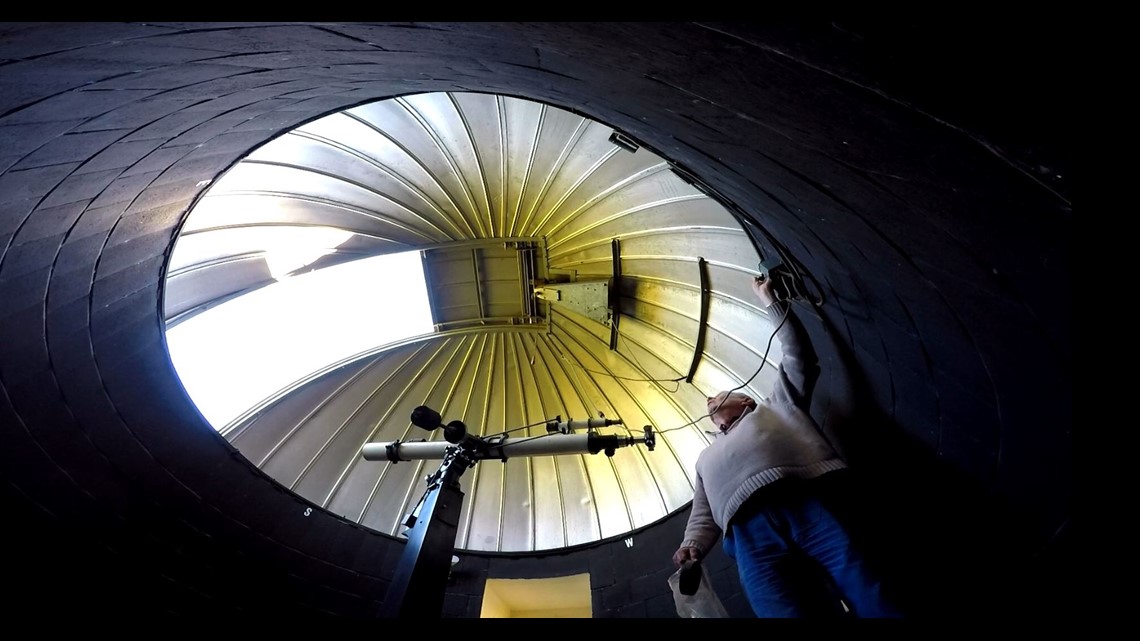If eclipse weather improves, 88-year-old with backyard observatory will have best seat around
Dr. Bill Kinzie looked toward the stars for decades. He's seen partial eclipses in his life but never a total one. He's hoping the cloudy weather takes a hike. Retired physician Dr. Bill Kinzie, who has been observing the stars for decades, is hoping for a total eclipse in Texas on April 8, which is expected to last for 4 minutes and 23 seconds off of Old City Lake in Ennis, Texas. Kinzie's backyard observatory is located off the edge of the lake, where the total eclipse is predicted to last 4 minutes, 23 seconds, the longest in the area. Despite the weather forecast being mostly cloudy, Kinzie believes he will be able to track the sun before the afternoon eclipse, even if it is broken clouds. His telescope in his observatory has been in his family since 1969, and he plans to have family and friends over for the event. His son, who sparked his astronomical passion, died at 63 in October.

Published : one year ago by Matt Howerton in Weather World
Dr. Bill Kinzie looked toward the stars for decades. He's seen partial eclipses in his life but never a total one. He's hoping the cloudy weather takes a hike.
ENNIS, Texas — As you're reading this, people from around the nation and the world are gearing up to trek to Texas to see our total eclipse on April 8.
Off of Old City Lake in Ennis, where totality is expected to last 4 minutes and 23 seconds, the longest in the area, retired physician Dr. Bill Kinzie only has to trek to his backyard.
Over the decades, Kinzie has mostly watched the planets, but now, something more significant is coming straight to him.
"Come Monday--I'll start getting ready around 10:30 in the morning. I'll open the observatory and tune in the sun--assuming we have visibility. I'm hoping for a sky like today! We sort of practiced during the previous partial eclipse," Kinzie said.
Kinzie's pleasant and polite demeanor is why patients in Ennis loved him for decades. He's the kind of Texan who makes you smile when you hear him say, "Bless their hearts." His family even gives back to medical students in the North Texas area through scholarships via the Kinzie Foundation.
Of course, the best way to see the eclipse is just by looking up--but Kinzie has a filter on his telescope that will allow him to start tracking the sun before totality in the afternoon.
That is if Mother Nature cooperates. The forecast for the DFW area for Monday is mostly cloudy, which is the only thing that could rain on our eclipse parade.
"Assuming we have visibility--we'll be able to see the stars and the eclipse too!" Kinzie said. "Even if it's broken clouds--it'll work."
The telescope in Kinzie's observatory has been in his family since 1969. Just three years before that, his love for astronomy was born when his son Scott asked for something to allow him to see the stars.
"It was 1966. When he was 10, we bought a $39 telescope from Sears, and when I tuned it up to the moon, I was just captured by it. This was before the lunar landings. From here, we can see the moon, Venus, Jupiter, Mercury, and Mars. The telescope has a four-inch refractor--it's got a lens, not a mirror. It's really just planetary," Kinzie said.
Kinzie plans to have family and friends over, yet someone important will be missing. His son Scott, who sparked his dad's astronomical passion, suddenly died at 63 in October. Kinzie told WFAA he'll think extensively about him when the big day comes.
